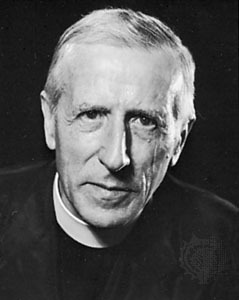Teilhard de Chardin: False Prophet of a “New Christianity”
“The Lord does nothing without telling His
servants the prophets” (Amos 3:7). Thus did the prophet Amos guarantee
that in every generation God would raise up prophets to interpret the
“signs of the times” correctly. But St. Paul in his letter to the
Thessalonians added that while God’s people should “despise not
prophesy,” they should “test everything and hold fast” only to “what is
good” (1 Thessalonians 5:21-22). To which St. John the Beloved added
that we should “believe not every spirit, but try the spirits if they be
of God: because many false prophets are gone out into the world” (1
John 4:1).
The Magisterium of the Church has already ruled that St. Symeon the New Theologian, St. Hildegard of Bingen, St. Bridget of Sweden, Venerable Maria of Agreda, and Blessed Anne Catherine Emmerich were true prophets, the last of whom bore witness to the truth of the Mosaic account of creation and the early history of mankind in the face of Enlightenment skepticism that heaped scorn upon Divine Revelation. When the Queen of Prophets appeared at Fatima, she then warned of the errors of Russia which would spread throughout the world. The greatest of these errors was evolutionism, which in its atheistic form denied God’s existence and in its theistic form denied the perfect beauty, truth, and goodness of His character.
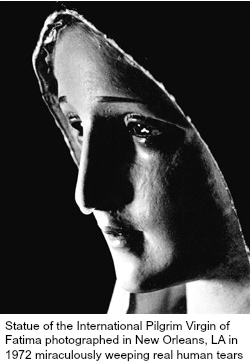
To those conversant with spiritual warfare, it is not surprising to learn that at the very moment that Our Lady warned the faithful against the “errors” of Russia, the same errors were being introduced surreptitiously into Catholic academia. Indeed, less than two years after the Miracle of the Sun at Fatima, when the three child-seers had had their last public encounter with the Queen of Prophets, Teilhard de Chardin, the future prophet of a “new Christianity” centered on evolution, had a pivotal, life-changing mystical encounter with what he later called “the Thing.” Describing his experience in the third person, Chardin wrote that:
the Thing swooped down. . . Then,
suddenly, a breath of scorching air passed his forehead, broke through
the barrier of his closed eyelids, and penetrated his soul. The man
felt he was ceasing to be merely himself; an irresistible rapture took
possession of him as though all the sap of all living things, flowing at
one and the same moment into the too narrow confines of his heart, was
mightily refashioning the enfeebled fibers of his being . . . And at the
same time the anguish of some superhuman peril oppressed him, a
confused feeling that the force which had swept down up him was
equivocal, turbid, the combined essence of evil and goodness . . .
“You called me here: here I am” [said
“the Thing”]. “Grown weary of abstractions, of attenuations, of the
wordiness of social life, you wanted to pit yourself against Reality
entire and untamed . . . I was waiting for you in order to be made
holy. And now I am established on you for life, or for death . . . He
who has once seen me can never forget me: he must either damn himself
with me or save me with himself.”[1]
In the light of these revelations, it is
not surprising to learn that Teilhard held that even “evil spiritual
powers” are the “living instruments” of Christ[2]
In the decades that followed, in his work as a paleontologist and
theologian, Teilhard opposed every tenet of the traditional Catholic
doctrine of creation with a new tenet of a new evolutionary creed.
The Fathers, Doctors, Popes and Council Fathers in their
authoritative teaching had all distinguished between God’s work of fiat
creation and the natural order of providence which only began after the
creation was finished with the creation of Adam and Eve. Teilhard
asserted that the creation and providence had always been “fused”
together.The Magisterium had always held that the different kinds of creatures had been created by “fiat.” But Teilhard insisted that everything had come into existence through an evolutionary process.
The Magisterium had defined that Adam was created body and soul, and Eve from Adam’s side. But Teilhard asserted that human evolution was “an indisputable fact of modern science.”
The Magisterium had taught that the first created world was complete and harmonious and that Original Sin brought human death, disease and deformity into the universe. But Teilhard protested that “[Original sin] drags us back inexorably into the overpowering darkness of reparation and expiation.”[3]
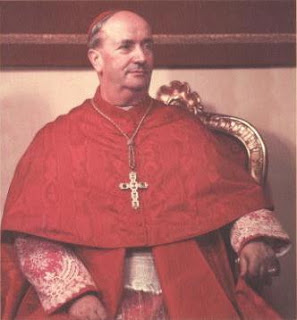
In 1962, Cardinal Ottaviani, then head of the Holy Office, issued a monitum, stating that De Chardin’s books were full of “serious errors that offend Catholic doctrine” and warning all bishops and seminary rectors to keep his books out of their libraries and especially out of the hands of the young. But De Chardin’s works exerted a powerful influence on the progressive bishops and their theological advisors throughout the Second Vatican Council. Historian Roberto De Mattei has noted that:
The discussion of schema XIII [Gaudium et Spes]
revealed how strong Teilhard de Chardin’s infuence was on the council.
The name of the French paleontologist frequently resounded in the hall.
On October 22, Archbishop Hurley of Durban, saluted “the illustrious son
of the Church, Teilhard de Chardin,” and compared his eschatology with
that of St. Paul. On October 26, Bishop Otto Spulbeck, bishop of
Meissen, stressed the great influence of Teilhard de Chardin on the
modern scientific world . . .[4]
The final text of Gaudium et Spes strongly reflected Teilhard’s influence, going so far as to assert that:
the human race has passed from a rather
static concept of reality to a more dynamic and evolutionary one (5) . .
. Man is on the way to a more thorough development of his personality,
and to a growing vindication of his own rights. (41) . . . We are
witnesses of the birth of a new humanism, one in which man is defined
first of all by his responsibility to his brothers and toward history
(55).
The Pope had made clear that the Second Vatican Council was a
pastoral council and that none of its pronouncements were infallible
unless so stated – except for those that reaffirmed doctrines previously
defined. A Preliminary Note was inserted before the text of Gaudium et Spes, which explained that:
In view of the conciliar practice and pastoral purpose of the present Council, the sacred Synod defines matters of faith and morals as binding on the Church only when the Synod itself openly declares so.[6]
No better example could be given of the necessity of this clarification than the Teilhardian propositions from Gaudium et Spes. How
could the Catholic Church teach that the human race had “passed” from a
“static concept of reality” to a “more . . . evolutionary one,” when
the Magisterium had always taught that a natural law exists which flows
from an unchanging human nature? How could “rights” be determined in an
objective manner, when the “evolutionary concept of reality” rejects
the very notion of an unchanging human nature? And how could the Church
approve of the perverse notion that man is defined first by
his responsibility to his brothers and toward history and not by his
responsibility toward God, his Creator and Redeemer? Only by
subordinating these statements to the prior infallible teaching of the
Church on the nature of man and his relationship with God could these
Teilhardian statements in Gaudium et Spes be prevented from sowing seeds of confusion and error in the minds of the faithful.
Teilhard de Chardin and the Religion of Antichrist
The fundamental difference between Teilhard de Chardin’s theistic
evolutionary concept of god and the true Catholic doctrine on the divine
nature is that the god of theistic evolution is not the perfect,
transcendent, unchanging Creator, Redeemer, and Sanctifier of the
world. Instead, the god of evolution is identified with the world.
Thus, the god of evolution did not create a perfectly harmonious world
out of nothing for man in the beginning of time – nor did the character
of that world change because of the Original Sin of Adam, requiring the
transcendent God to assume a human nature and atone for the sins of the
world. On the contrary, the god of theistic evolution intentionally
uses demons, death, destruction, mutation, struggle for existence and
extinctions to evolve his handiwork, providing the energy and
intelligence to accomplish the biological “leaps” that undirected
material processes cannot achieve. In the evolutionary view, as
summarized by popular author Ken Wilber, Jesus is not the Second Person
of the Most Holy Trinity made man, but a “spiritual guide” who helps all
human beings, without exception, to become sons and daughters of God.
According to Wilber:
Jesus’ primary religious activity was to
incarnate in and as his followers, in the manner, not of the only
historical Son of God (a monstrous notion), but of a true spiritual
Guide helping all to become sons and daughters of God . . . there are
three essential strands as revealed in the Gnostic Gospels: 1)
“Self-knowledge is knowledge of God; the [highest] self and the divine
are identical.” 2) “The ‘living Jesus’ of these texts speaks of illusion
and enlightenment, not of sin and repentance.” 3) “Jesus is presented
not as Lord but as spiritual guide.”[5]
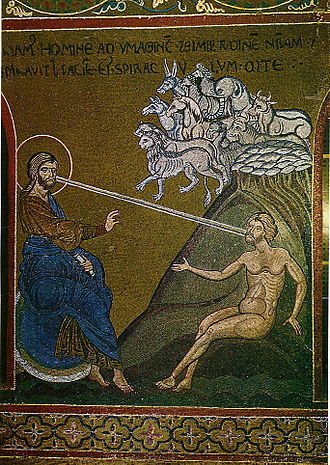
Catholic doctrine holds that God created a perfectly harmonious world for man in the beginning. According to theistic evolution, however, perfection has never existed in the past. Perfection lies at the “Omega point” in the future; and the god of evolution uses everything that happens to reach that “Omega point.” Catholic doctrine holds that man was created in the state of grace, sharing in God’s very own life, until sin separated Adam and Eve from God and deprived them of grace. However, in the theistic evolutionist system of Teilhard de Chardin:
grace represents a physical
super-creation. It raises us a further rung on the ladder of cosmic
evolution. In other words, the stuff of which grace is made is strictly
biological.[6]
One of Teilhard’s favorite themes was that the evolution of the
individual man had come to an end and had given way to a collective
evolution of mankind. According to Teilhard, this collective evolution
requires the erection of some kind of global government that will guide
mankind to its ultimate fulfillment. Both of these themes appear in Gaudium et Spes, which boldly asserted that the eradication of war:
requires the establishment of some
universal public authority . . . endowed with the effective power to
safeguard, on behalf of all, security, regard for justice and respect
for rights. (82)
The traditional teaching of the Church has always been that the
tranquility of order is achieved through the social reign of Christ the
King, and not through merely human efforts or institutions. However,
after Gaudium et Spes, Pope Paul VI hailed the United Nations
as a the “last great hope for concord and peace” . . . and exhorted the
world to “Let unanimous trust in this institution grow, let its
authority increase . . . “[7]
Pope St. John Paul II reinforced this new attitude, expressing the
“esteem of the Apostolic See and the Catholic Church for this
institution” . . . and hailing the United Nations as “a great instrument
for harmonizing and coordinating international life.”[8]That the “coordination of international life” by the United Nations might not be favorable to the glory of God or to His Church has become increasingly apparent, as the various agencies of the United Nations use their moral authority and financial resources to advance the anti-culture of death, promoting godless sex education, sexual immorality, abortifacient contraception and abortion, while hailing as “rights” sins which cry out to heaven for vengeance and undermining traditional morality throughout the world. To make matters worse, the champions of global government have intensified their efforts to enforce these “rights” through an International Criminal Court which will have authority over the whole world.
Seemingly undeterred by the prospect of having abortion and other unnatural “rights” enforced on Catholic nations by the ICC, the Vatican ambassador to the United Nations hailed the establishment of the Court as a substantial contribution to the “rights of all men and women”:
The creation of an International Criminal
Court is a very important initiative which will touch upon the rights
and lives of nations and communities . . . May almighty God bless our
efforts to so that future generations will look upon this Court as a
substantial contribution to respect for law and for the rights of all
men and women throughout the world.[9]
Theistic Evolution and the New World Order
According to Teilhard de Chardin, the evolution of consciousness and
global government must be accompanied by a new religion that will bring
all prior religions to their fulfillment. Teilhard even waxed poetic
over the exciting evolutionary breakthroughs that could be achieved as
man – dare we add, through his enlightened global government? –
discovers how to manipulate his “biological” make-up to assist in his
own evolution. Enraptured by the possibilities opened up by atomic
fission and the detonation of the first atomic bomb, Teilhard asked:
Was it not simply the first act, even a
mere prelude, in a series of fantastic events which, having afforded us
access to the heart of the atom, would lead us on to overthrow, one by
one, the many other strongholds which science is already besieging? The
vitalization of matter by the creation of super-molecules. The
remodeling of the human organism by means of hormones. Control of
heredity and sex by manipulation of genes and chromosomes. The
readjustment and internal liberation of our souls by direct action upon
springs gradually brought to light by psychoanalysis. The arousing and
harnessing of the unfathomable intellectual and effective powers still
latent in the human mass.[10]
In the fifty years since The Future of Mankind was
published, the world has seen plenty of “remodeling of the human
organism by means of hormones” in the form of birth control pills –
resulting in the deaths of a quarter of a billion tiny children each
year by conservative estimates, ten times the number of children
murdered in surgical abortions. During the same period, the world has
witnesses an orgy of “control of heredity and sex” not so much by the
manipulation of genes as by the destruction of tens of millions of
little girls (for the crime of being girls) and of children of both
sexes for the crime of having some real or imagined genetic defect. And
as to the “liberation of our souls” through “psychoanalysis,” there is
no doubt that the psychologist and psychiatrist have replaced the priest
and confessor as the liberators of souls, offering secular humanist
counseling and drugs in place of Catholic teaching and the life-giving
sacraments. Moreover, the fulfillment of Teilhard’s vision has been
accomplished in large part through the work of that “last great hope for
concord and peace,” the United Nations.
Towards the Omega Point
Since “the stuff of which grace is made is strictly biological,” in
Teilhard’s system, it is not a gift of participation in the divine
nature, conferred upon our first parents at creation or restored to
souls through baptism. It is a by-product of evolution. Even Christ is
“saved by evolution” since His incarnation is a product of the same
evolutionary process by which He, according to Teilhard, evolves the
entire universe to its cosmic fulfillment. Indeed, in this system, even
atheists participate in the evolutionary process which propels them
along with adherents of the Catholic religion towards the “Omega
point.” Of Marxism and Christianity, Teilhard wrote:
The two extremes confronting us at the
moment, the Marxist and the Christian, each a convinced believer in his
own particular doctrine . . . [must be] we must suppose, fundamentally
inspired with an equal faith in Man . . . Is it not incontestable that
despite all ideological differences they will eventually, in some
manner, come together on the same summit? . . . for in the nature of
things everything that is faith must rise, and everything that rises
must converge.[11]
This brand of Teilhardian theistic evolutionism has become the
predominant religious belief of the champions of global government and a
New World Order. Transpersonal psychologist Ken Wilber, a favorite of
such globalist luminaries as Bill Clinton and Al Gore, has become one of
the most widely translated academic authors in the United States by
peddling an elaborated version of Teilhard’s theistic evolutionary
religion. Wilber rejoices that Teilhard’s vision of the Omega point:
as a future attractor for present
evolution – a notion borrowed from Schelling and Hegel – freed many
Christians from the impossible mythic belief in a literal Garden of Eden
and a morbid fixation (a Romantic death wish) to the long-deceased
past.[12]
Wilber credits Teilhard with hastening the Western world’s acceptance of the most important shift in modern thought – from
The idea of history as devolution (or
Fall from God) . . . [to the idea] of history as evolution (or a growth
toward God) . . . Evolution is simply Spirit-in-action, God in the
making, and that making is destined to carry all of us straight to the
Divine.[13]
The appeal of this way of thinking to powerful individuals and groups
seeking a justification for harsh measures deemed necessary to hasten
mankind’s “growth toward God” appears starkly in the statements of Adolf
Eichmann at the end of his life. As Hitler’s choice to implement the
“final solution” and eliminate as many Jews as possible, Eichmann was
kidnapped from South America after the Second World War and taken to
Israel to stand trial for crimes against humanity. As he awaited
execution, he was interviewed several times by a Lutheran pastor who
sought to reconcile him with God before his death. Eichman repeatedly
dismissed the pastor’s call to faith and repentance, arguing that he
believed in the god of evolution who had used millions of years of
struggle for existence to evolve the first human beings. Rather than
take responsibility for his part in the murder of hundreds of thousands
of human beings, Eichmann insisted that such actions were an inevitable
part of the evolutionary process which would be overcome, not through
repentance and conversion to a new life in Christ, but through
evolution, which would gradually transform human nature, willy-nilly,
over aeons of time.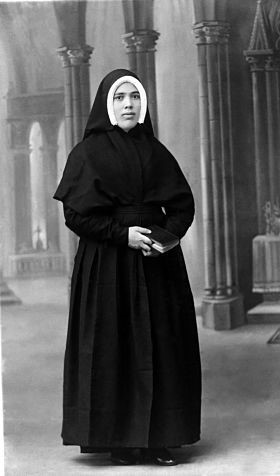
Reading the works of Wilber and his fellow travelers brings home how much the architects of the New World Order resemble Eichman and his Nazi colleagues in their willingness to use whatever means will achieve their evolutionary ends. The cooperation of Church leaders in the establishment of a godless global government supported by a Teilhardian one-world religion is suicidal; it shockingly demonstrates what Sister Lucia of Fatima referred to as the “diabolical disorientation” of our times.
The material in this article has been taken from the book Genesis through the Eyes of the Saints which is available at this link as an e-book.
[1] Quoted in Fr. SERAPHIM ROSE, Genesis Creation and Early Man (Platina, CA: St. Herman of Alaska Brotherhood, 2000), p. 580.
[2] TEILHARD DE CHARDIN, Christianity and Evolution, 184-185.
[3] TEILHARD DE CHARDIN, Ibid, pp. 70-80.
[4] ROBERTO DE MATTEI. The Second Vatican Council: The Unwritten Story, p. 387
[5] KEN WILBER, quoted in SERAPHIM ROSE, Genesis, Creation and Early Man (Platina, CA: St. Herman Brotherhood, 2000), pp. 571-572.
[6] TEILHARD DE CHARDIN, quoted in Teilhardism and the New Religion, WOLFGANG SMITH, p. 217.
[7] PAUL VI, Address to the United Nations, October 4, 1965.
[8] JOHN PAUL II, Address to the United Nations, October 5, 1995.
[9] RENATO MARTINO, Osservatore Romano, June 17, 1998.
[10] TEILHARD DE CHARDIN, The Future of Mankind, p. 149.
[11] Ibid, pp. 198-199.
[12] K. WILBER, quoted in S. ROSE, Genesis, Creation and Early Man (Platina, CA: St. Herman Brotherhood, 2000), p. 565.
[13] K. WILBER, quoted in S. ROSE, op. cit., p. 562.

